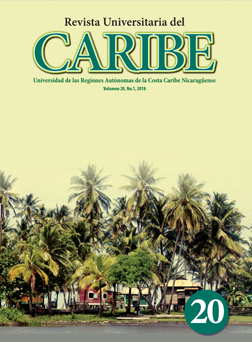Metodología de ordenamiento territorial en la RACCN, un aporte al desarrollo con identidad
Resumen
Con el fin de proponer una metodología, que responda a la nueva realidad de distribución territorial de la Región Autónoma de la Costa Caribe Norte de Nicaragua, se presenta la “Metodologías de ordenamiento territorial en la RACCN, un aporte al desarrollo con identidad”. Tuvo como caso de estudio el territorio indígena miskitu de Twi Waupasa y el territorio Mayangna Sauni Bas. La investigación metodológicamente fue desde el paradigma de la ciencia crítica, la cual busca comprender la realidad, para su posterior transformación. Se dinamizó la información de campo de los grupos metas, así también los procesos que se ha desarrollado en los planes de ordenamientos territoriales en el ámbito nacional, regional y territorial. Teniendo como base las entrevistas directas, grupo focales, revisión de investigaciones primarias, así como la revisión de bibliografías secundarias que sostiene las teorías propuestas en la investigación. Los estudios de Ordenamiento y Desarrollo Territorial nacional, tienen un enfoque departamental y municipal, y su metodología está comprendida en cinco Etapas en base al INETER, y siete momentos metodológicos en base al Nuevo FISE-GIZ, que definió una metodología específica para la RACCN. La propuesta metodologica tiene 5 momentos estratégicos (Consentimiento previo libre e informado, Diagnóstico participativo, prospectiva y modelo futuro, presentación, concertación y aprobación e Instrumentación e implementación) con sus 41 acciones. Esta propuesta aportará de manera significativa para los territorios indígenas y comunidades de la RACCN, en la gestión, articulación, desarrollo, incidencia, gobernabilidad, gobernanza y así responder al paradigma del buen vivir y vivir bien de los pueblos indígenas de la Costa Caribe nicaragüense.






